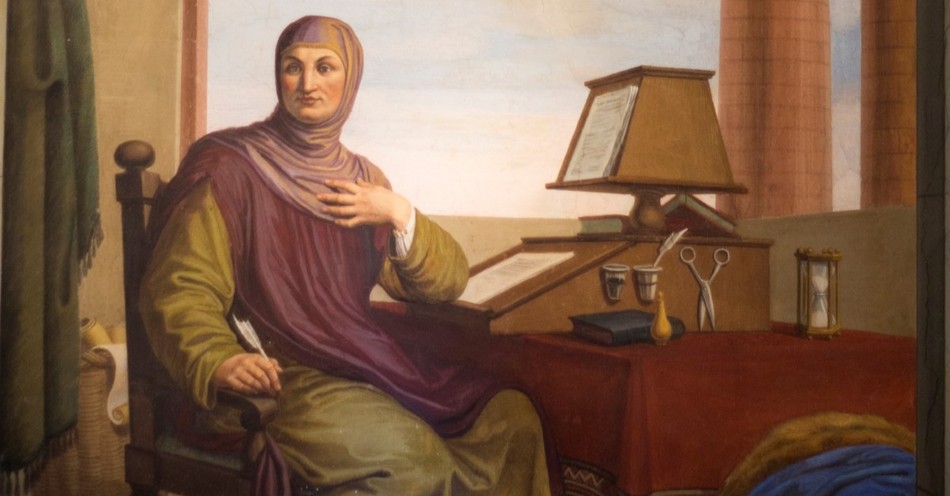After Dante Alighieri was exiled from his home, he began working on his epic poem, The Divine Comedy in 1308. The emotional pain experienced by Dante of being exiled from the people and the place he dearly loved inspired him to finish his epic masterpiece which explores suffering, doubt, sin, faith, and hope.
When Was Dante Alighieri Born?
Dante was born in Florence, Italy, in 1265. Dante had his beginnings in a country of rich culture and flourishing art. However, the city also had intense political and religious turmoil. The feuding between the imperial and papish parties had been going on for many years.
In his youth, Dante studied the Bible as well as Greek and Roman thought. These studies and being mentored by Italian thinker Brunetto Latini gave him a love for writing and languages. Although Dante suffered the shame and pain of being exiled from the place he loved most, he wrote his most iconic work during his exile. It was published in 1321. The epic poem has inspired many great writers, such as Geoffrey Chaucer, T.S. Eliot, John Milton, C.S. Lewis, and Aleksandr Solzhenitsyn.
What Theological Themes Appear in Dante’s Work?
One of the most important theological themes in The Divine Comedy is the existential experience of someone’s mind and heart being changed by the agape love of Christ, a love bringing forth redemption. Though many different mythologies influence Dante’s masterpiece, it is a Christian allegory about a sojourner’s journey from Hell, Purgatory, to Heaven. Dante showed through allegory the spiritual pilgrimage of a Christian going through suffering before finally experiencing great joy by being united with Christ.
Pride is another important theological theme in Dante’s epic poem. Judeo-Christian thought maintains that the sin of pride caused Lucifer to fall from grace and become Satan (as recorded in Ezekiel 28 and Isaiah 14). The sojourner guided through Dante’s poem sees the sobering sight of damned souls suffering in Hell because they would not relinquish their pride during earthly life.
The most important theological theme in Dante’s epic is hope. Without hope in Christ, our faith is in vain, and death would be the final victor. Because of Jesus’s Resurrection in the first century, Christians have hope in the here and now because of what’s coming in the New Jerusalem. Being a Christian, Dante deliberately made the theological virtue of hope the most important aspect of his epic poem, as is shown in the end when Dante’s character finally makes his way to Paradise.
It would have been easy for Dante to succumb to despair in exile. Instead, he clung to his faith in Christ and found healing in writing poetry that has inspired many artists around the world.
How Did Dante Get Exiled from Florence?
Dante was exiled from his beloved Florence for joining a feud. The conflict involved two factions, with one side (the White faction) wanting a city republic to rule Florence and the other (the Black faction) wanting the papacy to have that power. Dante joined the White faction, confident that his political and literary career would secure his safety and security. Sadly, political trickery ended those dreams, and he was exiled to Tuscany in 1302.
Dan Graves describes the buildup to Dante’s exile and its impact:
“For Dante, political failure was costly. A ‘White’ in the internal struggles of Florence, he became one of the city’s six priors. Disturbances broke out with the ‘Blacks.’ The even-handed priors expelled the worst Blacks and Whites. The Pope, dependent on Black money, excommunicated the city unless it should restore the troublesome Blacks.
In November 1300, Dante, with others, traveled to Rome to plead with the Pope to lift the interdict. The Pope relented. He was, however, playing a double game. While negotiating with Florence he secretly invited Charles of Valois to bring an army to Italy. He sent Charles to Florence to make ‘peace.’ The Florentines, long friendly to the House of France, were reluctant to deny Charles entrance to their city, although they suspected him of duplicity.
Charles indeed proved to be a serpent. He betrayed the legitimate government, strengthened the Blacks and allowed them to enter the city. They immediately went on a five day rampage, looting, killing, and burning. They deposed the Whites and with them Dante. On this day, March 10, 1302, the victorious Blacks exiled him on pain of being burnt alive if he ever returned.
The banishment was deeply distressing to Dante. Emotionally it took him years to accept what had happened. He never saw his wife again, although some of his children visited him shortly before his death. In exile, Dante solaced himself with writing. One book defended the use of the Italian language over Latin. He produced a series of poems called Convivo (Banquet). In a treatise he argued for separation of church and state. Through letters he sought to influence Florentine politics. The collapse of his political hopes led him to stake his chance of restoration on one last, great work.
It is not known just when he began the Divine Comedy. A giant epic of love and faith, Dante envisioned it in three parts, Hell, Purgatory, and Paradise. It yearns with utopian nostalgia for a Pan-Christian empire and radiates a Boethian sense of divine reality. ‘. . . in His own eternity, outside of time, outside of every other limit, as it pleased Him, the Eternal Love disclosed Himself in new loves.’
Banishment drew out Dante’s genius. The Divine Comedy’s vigorous style fixed the Italian language in its modern form well before the same was true of any other European tongue. He had been a poet, lover, father, ruler, soldier, and diplomat. Inevitably his work reflects this breadth of interests. Nonetheless, its merit escaped most contemporaries and did not win him a return to Florence. In fact, the church would place the Divine Comedy on the Index of Prohibited Books, probably because Dante had consigned seven wicked popes to hell.”
Bibliography:
1. Dante Alighieri. The Divine Comedy. Various editions.
2. “Dante Alighieri.” The Oxford Dictionary of the Christian Church. Edited by F. L. Cross and E. A. Livingstone. Oxford, 1997.
3. Dante’s Guide to Heaven and Hell. Christian History 70.
4. D’Souza, Dinesh. The Catholic Classics. Huntington, Indiana: Our Sunday Visitor, 1986.
5. Freccero, John. Dante; A Collection of Critical Essays. Englewood Cliffs, N.J., Prentice-Hall, 1965.
6. Gardner, Edmund G. “Dante Alighieri.” The Catholic Encyclopedia. New York: Robert Appleton, 1914.
7. Hawkes, Francis L, Editor. Pictorial Cyclopaedia of Biography. New York: Appleton, 1856.
Recommended8. Sayers, Dorothy L. “Dante and Charles Williams.” The Whimsical Christian. New York: Macmillan, 1978.
9. Various encyclopedia and internet articles.
(“Banished Dante Wrote the Divine Comedy” first appeared on Christianity.com on April 28, 2010)
What Are Some Great Poems Other than the Divine Comedy that Dante Alighieri Wrote?
In 1294 Dante’s La Vita Nuova was published. The book of poetry was inspired by personal experiences of both joy and pain Dante had related to his muse Beatrice. Dante saw Beatrice around the age of 9 in Florence and fell in love with her. The last time Dante saw Beatrice was in 1283. The love between them was unrequited. As painful as this was for Dante, it inspired much of his work.
Le Rime is a collection of poems by Dante that was translated and published years after his death. The collection of poems spans the years of Dante’s life between the 1280s and 1308. The lyric poems capture the existential struggles and joys Dante experienced.
Who Are Some Christian Writers that Dante Alighieri Influenced?
A list of all the people that Dante’s work has influenced would probably become a book by itself. Here are a few particular modern writers whose work was informed by his poetry, often using that influence to create interesting works of their own.
Dante’s work greatly influenced British mystery writer and lay theologian Dorothy L. Sayers. Sayers was so enthusiastic about The Divine Comedy that she wrote her own verse translation from the original Italian into English. Her translations were published in 1949.
C.S. Lewis was a great literary scholar who showed Dante’s influence in several works, most notably his 1945 book The Great Divorce. In this afterlife fantasy, the protagonist explores what Heaven and Hell look like. Just as Virgil guides Dante through Purgatory, Hell, and Heaven, George MacDonald guides Lewis’ protagonist through Heaven. Like Dante, Lewis explores the importance of life decisions made here and now in the context of eternity.
Charles Williams, friend of C.S. Lewis and a fellow member of the Inklings, was greatly influenced by Dante. His scholarly book The Figure of Beatrice explores the theme of romantic love in Dante’s poetry, showing how Dante’s love for Beatrice informed his work.
10 Classic Books by Dante Alighieri
1. Vita Nuova
2. The Divine Comedy Party 1: Hell
3. The Divine Comedy Part 2: Purgatory
4. The Divine Comedy Part 3: Paradise
5. De Monarchia
7. Rime
Selections and annotated editions of Dante’s work can be found in these books:
8. The Portable Dante edited by Mark Musa
9. The Divine Comedy Annotated Edition translated by Henry Francis Cary
10. Dante in English edited by Matthew Reynolds
10 Great Books about Dante Alighieri
Some of these books look at Dante’s work, others explore writers he influenced, and others consider what lessons we can learn from his life today. Whatever angle they take, they are well worth exploring.
1. The Figure of Beatrice: A Study in Dante by Charles Williams
2. How Dante Can Save Your Life: The-Life Changing Wisdom of History’s Greatest Poem by Rod Dreher
3. Dante: A Life by Alessandro Barbaro
4. Dorothy L. Sayers A Biography: Death, Dante, and Lord Peter Wimsey by Colin Duriez
5. The Florentines: From Dante to Galileo: The Transformations of Western Civilization by Paul Strathern
6. Dante’s Bones: How A Poet Invented Italy by Guy P. Raffa
7. Dante: The Story of His Life by Marco Santagata
8. Into a Dark Wood: What Dante Taught Me About Grief, Healing, and the Mysteries of Love by Joseph Luzzi
9. The Cambridge Companion to Dante by Rachel Jacoff
10. Dante in Context by Zygmunt G. Baranski
To read more about great Christian poets and poems, check out these articles:
7 Christian Women Poets You Need to Know About
Poet and Fantasy Author Robert Siegel
4 Christian Poems to Inspire Believers
What Makes Wendell Berry a Great Christian Writer?
20 Great Books on Christian Music
What Can Christians Learn From John Donne?
10 Christmas Poems about Jesus
Photo Credit: © Getty Images/iljacker
Justin Wiggins is an author who works and lives in the primitive, majestic, beautiful mountains of North Carolina. He graduated with his Bachelor's in English Literature, with a focus on C.S. Lewis studies, from Montreat College in May 2018. His first book was Surprised by Agape, published by Grant Hudson of Clarendon House Publications. His second book, Surprised By Myth, was co-written with Grant Hudson and published in 2021. Many of his recent books (Marty & Irene, Tír na nÓg, Celtic Twilight, Celtic Song, Ragnarok, Celtic Dawn) are published by Steve Cawte of Impspired.
Wiggins has also had poems and other short pieces published by Clarendon House Publications, Sehnsucht: The C.S. Lewis Journal, and Sweetycat Press. Justin has a great zeal for life, work, community, writing, literature, art, pubs, bookstores, coffee shops, and for England, Scotland, and Ireland.
This article is part of our People of Christianity catalog that features the stories, meaning, and significance of well-known people from the Bible and history. Here are some of the most popular articles for knowing important figures in Christianity:
How Did the Apostle Paul Die?
Who are the Nicolaitans in Revelation?
Who Was Deborah in the Bible?
Who Was Moses in the Bible?
King Solomon's Story in the Bible
Who Was Lot's Wife in the Bible?
Who Was Jezebel in the Bible?
Who Was the Prodigal Son?









